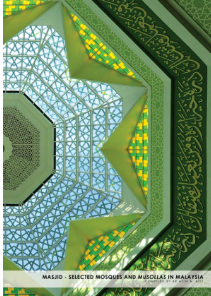
The Sultan Haji Ahmad Shah Mosque stands as a prime example of how a university mosque can be thoughtfully integrated into an Islamic campus layout. Located at the heart of the main campus of the International Islamic University Malaysia (IIUM) in Gombak, Selangor, the mosque embodies the institution’s vision of uniting religious and secular knowledge. As part of one of the country’s earliest Islamic universities, the mosque is considered a central element in both spiritual life and academic pursuit, reflecting the inseparable nature of the two in the IIUM ethos.
Surrounded by academic and administrative buildings, the mosque is strategically connected to key campus facilities—including the library and classrooms—via covered walkways and landscaped courtyards. Multiple entrances provide access to the mosque and its grounds, including one from the qibla wall side that opens onto a welcoming porch and plaza.
The mosque’s exterior features a combination of blue glazed tiles and a warm brown concrete spray finish. Though modest in scale compared to nearby structures, it is distinguished by its signature Nabawi-inspired hemispherical blue dome and twin, slender Ottoman-style minarets—making it a recognizable landmark across the campus skyline.
An open-air ablution pavilion is positioned at the eastern entrance, topped with a dome mirroring the main dome’s form. A surrounding corridor encircles the main prayer hall and doubles as an extended prayer space during large gatherings. The corridor’s pointed arches are accented with stained glass and framed in geometric grille patterns, creating an interplay of light and shadow.
Inside the main prayer hall, the central dome rests on a contemporary adaptation of a squinch supported by six large piers, which in turn form grand arches that define the space. Upper prayer galleries flank three sides of the hall, leaving the qibla wall open. To encourage cross ventilation, the architect designed the prayer hall with wide openings and minimal solid walls, allowing natural airflow to circulate freely.
A grand chandelier hangs from the center of the dome, accompanied by two large S’ fans recently added at the front and rear of the hall for improved air movement. The mihrab niche, composed of three pointed arches, features intricate plasterwork and sits prominently at the center of the qibla wall. To its right, a finely crafted wooden mimbar, influenced by traditional Malay design, completes the space with a nod to local architectural heritage.
Disclaimer : Mopsqpedia is a non-profit database. All images featured in the database are sourced from various references, publications, and websites related to mosque architecture. Mosqpedia does not claim ownership of any images unless explicitly stated. Images are provided solely for educational and bibliographic purposes. Mosqpedia disclaims any responsibility for copyright infringements related to the images displayed. Users are responsible for verifying copyright status and obtaining permission from original sources if they intend to reproduce, distribute, or use any image beyond fair use.
I agree to the terms outlined below:
You agree to upload and assign Mosqpedia Database the rights to use the content worldwide and in perpetuity across all current and future media platforms. Mosqpedia Database may edit, copy, adapt and translate your contribution.
The content will be distributed under the Creative Commons Attribution-Deed – Attribution-NonCommercial-NoDerivatives 4.0 International – Creative Commons
All data will be stored in line with data protection regulations.
I agree to the terms outlined below:
You agree to upload and assign Mosqpedia Database the rights to use the content worldwide and in perpetuity across all current and future media platforms. Mosqpedia Database may edit, copy, adapt and translate your contribution.
The content will be distributed under the Creative Commons Attribution-Deed – Attribution-NonCommercial-NoDerivatives 4.0 International – Creative Commons
All data will be stored in line with data protection regulations.